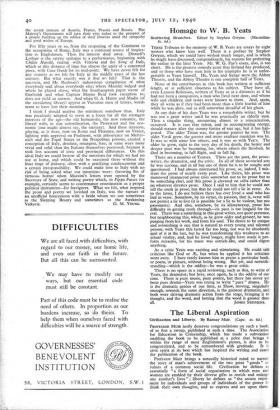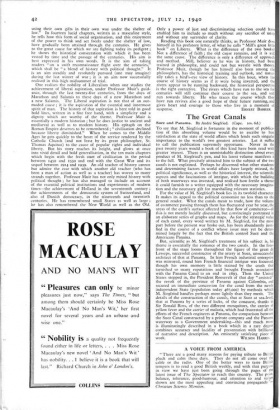The Liberal Aspiration
Civilization and Liberty. By Ramsay Muir. (Cape. 23. 6d.) PROFESSOR Must justly deserves congratulations on such a book, of so fine a sweep, published at such a time. The Association for Education in Citizenship, which has made a subvention enabling the book to be published at a price that brings it within the range of most Englishmen's purses, is also to be congratulated, and to be remembered with gratitude. It is civic spirit at its best which has inspired the writing and eased the publication of the book.
Professor Muir brings a naturally historical mind to narrate the story of man's achievement of the two great " goods " o: values of a common social life. Civilisation he defines as essentially " a form of social organisation in which men and women are enabled by their diverse gifts to enrich and ciliary one another's lives " ; liberty he defines as " the secure enjoy- ment by individuals and groups of individuals of the power to think their own thoughts, and to express and act upon them,
using their own gifts in their own way under the shelter of law." In fourteen lucid chapters, written in a masculine style, he tells how this form of social organisation, and this enjoyment of the power to think and act freely under the shelter of law, have gradually been attained throLgh the centuries. He gives to the great cause for which we are fighting today its pedigree ; he shows the historical consecration with which it has been vested by time and the passage of the centuries. His aim is best expressed in his own words. It is the aim of taking readers " on a swift reconnaissance flight over the centuries," which shall be " a blend of history with political thought." It is an aim steadily and resolutely pursued (one may imagine) during the last winter of war ; it is an aim now successfully realised in this high midsummer of trial.
One realises the nobility of Liberalism when one studies the achievement of liberal aspiration, under Professor Muir's guid- ance, through the last twenty-five centuries, from the days of Marathon and Salamis to these days of a new Marathon and a new Salamis. The Liberal aspiration is not that of an out- moded cause ; it is the aspiration of the essential and innermost spirit of man. The history of that aspiration is here told in good bold lines, written in a fine free hand, with a simplicity and a dignity which are worthy of the theme. Professor Muir is essentially a modern historian ; but he does justice to ancient and mediaeval as well as to modern history. His epitaph on the Roman Empire deserves to be remembered ; "civilisation declined because liberty diminished." When he comes to the Middle Ages he gets quickly to the heart of the service rendered by the Catholic Church (and not least by its great philosopher, St. Thomas Aquinas) to the cause of popular rights and individual liberty. But his story reaches its height, and glows at once into vivid detail and bold generalisation, in the ten main chapters which begin with the fresh start of civilisation in the period between 145o and 155o and end with the Great War and its sequel between 1914 and 1939. An old teacher of history cannot but admire the ease with which another old teacher (who has been a man of action as well as a teacher) has woven so many strands together. Professor Muir has not only mixed history with political thought ; he has also managed to include an account of the essential political institutions and experiments of modern times—the achievement of Holland in the seventeenth century ; the achievements of the democratic system of Switzerland, and also of Danish democracy, in the nineteenth and twentieth centuries. He has remembered small States as well as large ; he has also remembered the New World as well as the Old. Only a power of just and discriminating selection could have enabled him to include so much without any sacrifice of unity and without any surrender of clarity.
Reading this book one naturally thinks, as Professor Muir does himself in his prefatory letter, of what he calls " Mill's great little book " on Liberty. What is the difference of the two books? Not a difference of faith ; the old cause remains, and it is still the same cause. The difference is only a difference of approach and method. Mill, believer as he was in history, had been trained in philosophy, and could not but wrestle with theory. Professor Muir, though he has himself also been among the philosophers, has the historical training and outlook, and natur- ally takes a bird's-eye view of history. In this hour, when the course of history seems as if it were being inverted, and the rivers appear to be running backward, the historical perspective is the right corrective. The rivers which have run to the sea for centuries will still continue their course to the sea, and still run towards liberty. He who traces the course which they have run revives also a good hope of their future running, and gives heart and courage to those who live in a moment of



























 Previous page
Previous page